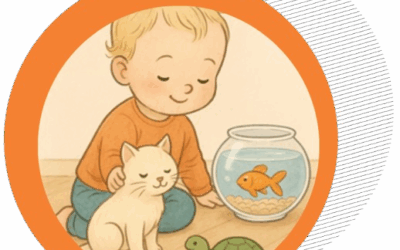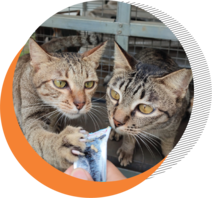
6 Game Ideas for Primary School Age Children Grades 1-3
By: Drh. Mikeu Paujiah, Dipl. Montessori and Maryam Smeer, S. Kom
Translator : AWI Team
At the developmental stage of primary school-age children, it is important to instil moral values such as empathy and responsibility. One effective way to achieve this is by learning about animal welfare.
Here are 6 educational game ideas that can be implemented in schools.
1. ‘Animal Roles’ Game
Objective: To teach children about the lives and needs of animals.
How to play: Each student plays the role of an animal, such as a cat, dog or bird. They have to act according to the animal’s needs (e.g. finding food, shelter or play). The teacher gives scenarios related to how humans should take care of them.
Benefits: Children understand that animals have basic needs that must be met for their well-being.

2. ‘Guess the Animal’ Game with Information Cards
Objective: To teach students to recognise different types of animals and take care of them properly.
How to play: Create cards with a picture of an animal on one side and information about the animal’s food, habitat, and how to care for it on the other side. Students have to guess what animal it is and learn how to care for it based on the clues.
Benefits: Children learn about different types of animals and how to take good care of them.

3. ‘Food Chain and Ecosystem Balance’ Game
Objective: To teach the importance of maintaining a balanced ecosystem and the role of animals in the environment.
How to play: Create a simple food chain simulation where each student plays a part of the ecosystem (such as a predator, herbivore or plant). Discuss the impact on animal welfare if there is a disturbance in the ecosystem.
Benefits: Children learn about the relationships between animals and the importance of the balance of nature for the well-being of all living things.

4. ‘Animal Rescue Mission’ game
Objective: To teach about caring for animals that are abandoned or in danger.
How to play: Create a board or field game where students go on missions to rescue animals that need help. Students must follow instructions to feed, care for and protect the rescued animals.
Benefits: Children learn about empathy and caring for abandoned or injured animals.

5. ‘Animal Welfare Quiz’ Game
Objective: To test students’ knowledge on how to take good care of animals.
How to play: Create an interactive quiz in class with questions about animal care, such as what is the right food for different types of animals or how to keep them clean. The quiz can be done in groups
Benefits: Children learn in a fun way about the importance of animal welfare and how to care for them properly.

6. ‘Make an Animal House’ Game
Objective: To teach the importance of a safe and comfortable habitat for animal welfare.
How to play: Students use simple materials to build model houses or cages for animals. Afterwards, they explain why the house is suitable and what is needed for the animals to feel safe.
Benefits: Children learn about the importance of habitat for animal welfare.


These games can help foster students’ empathy and sense of responsibility towards animal welfare, as well as increase their knowledge of basic needs and the importance of preserving nature.
Find more game ideas and worksheets in the syllabus developed by the Animal Welfare Indonesia team. Please download it for free at the following link.
You can also teach children about loving animals through storybooks. Animal Welfare Indonesia has compiled a storybook as a medium to teach Animal Welfare which can be read for free at this link
Related Post :









